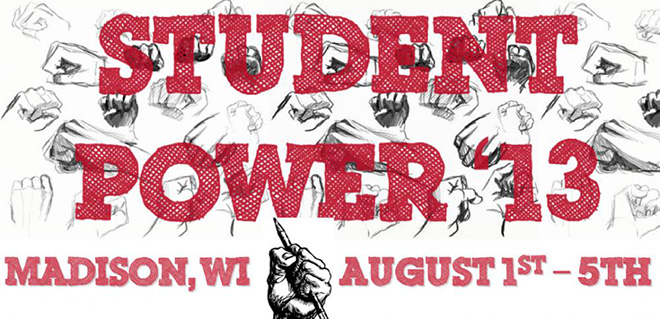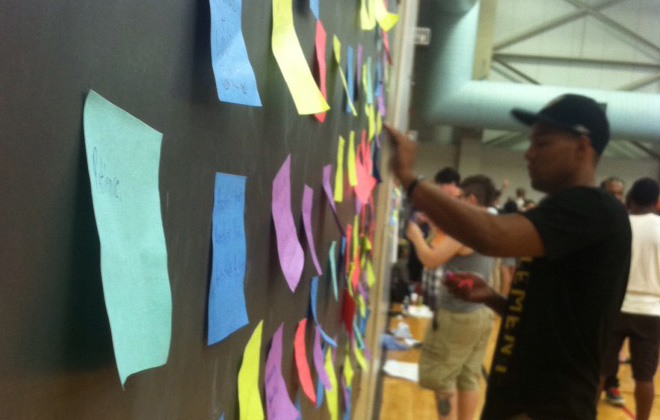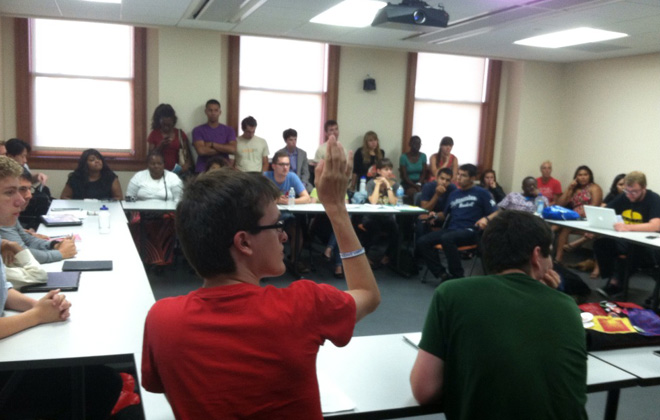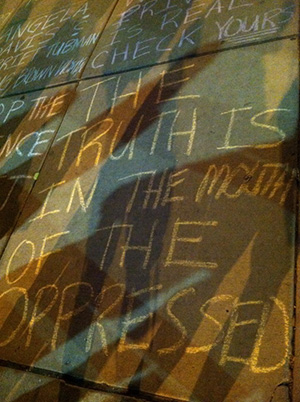NSPC Reportback: Our Struggles! Our Fight!

The 2nd Annual National Student Power Convergence was held in Madison, Wisconsin. We're inviting all NSPC participants to write their recaps, lessons learned, and critiques of the event — send a tweet to @forstudentpower if you'd like yours posted here!
Below is a reportback (+ photos) from Sara Fitouri, Denver-based organizer with COSPA, the Colorado Student Power Alliance.

“Our Struggles! Our Fight! Students of the world unite! We have only one solution! We must lead the revolution!”
From August 1st - 5th more than 300 youth from around the nation converged in Madison, Wisconsin for a weekend of radical thought, workshops including anti-oppression and direct action trainings, and reporting back on a year of work in their home states. Panels and trainings illuminated the school to prison pipeine that directs marginalized youth into prisons instead of college campuses, and student debt organizers highlighted the economic burden of paying for education that those who made it to campus would pay for most of their lives.
This particular chant started off the weekend. Lead by the youth arriving from New York City and New Jersey, it set a tone of urgency and political anger that embodied the spirit of the convergence and what would be the goal of the next few days. As members of the student movement, much of our success depends on our ability to join together in order to revolutionize the state of education.
It is unlikely that anyone present would disagree that student-led change is imperative for the betterment of our schools and, as education is the stepping stone to our greater community interaction, our world. Unfortunately, uniting a student movement is something less simple than leading a chant.
The convergence, overall, became a microcosm of the dynamics within the greater student organizing community (or at least the parts of the community with which I personally am familiar) Throughout the weekend, participants became caught up in many of the same dilemmas that our organizations face regularly. This is not particularly surprising. If we had figured out the correct way to unite together, engage democratically, develop a space that is anti-oppressive and build power to make positive change all at once, we would have already won. Like the greater struggle, just because we haven’t gotten it right yet is no reason to stop fighting. In fact, it is through the process that we grow as a movement, that we work off our rough edges and get closer to developing an organizing community that reflects the society we are trying to build. It was in those moments during which values clashed and decisions were challenged that I learned the most: from the organizers' ability to accept criticism, people's entitlement to space, or the ways in which we often unintentionally pigeonhole people whose religious or cultural values we end up unfairly conflating with conservative politics.
Despite its shortcomings, the National Student Power Convergence filled a needed space in the student movement and provided the opportunity to network with a wide and diverse range of students who are, despite our differences, committed to an important agenda. Because it is free to register and the organizers worked to subsidize travel, there were perspectives present that usually get omitted from the conversation. At the convergence, race was a regular part of the conversation, the word “revolution” could be used without provoking negative reactions, and the voices of students and youth dominated the conversation. Many youth who were new to that type of space opened themselves up to the community around them and the final day expressed their own personal transformations to the group.
A call for transparency and challenging authority

Even before arriving in Madison, people were curious about the organizing of the convergence. The steering committee didn't seem able to actually steer and the movement summer interns hired from around the country focused solely on recruitment. My connections with the organizers before the convergence illuminated a scene I too had found myself in many times before: a few people scrambling to complete everything, and in their rush, not cultivating the space to let other people in. It’s easy for me to condemn this leadership mistake, but then I stop to think of how often I have struggled to delegate tasks, made minor and major decisions that upon reflection should have come with group input, and also failed to update my base with crucial information. Sometimes through working with other people we notice what we ourselves need to work on.
I believe that the lack of transparency didn’t come from a lack of integrity, but rather from overwhelmed organizers.That being said, holding each other accountable is crucial for the integrity of the movement. During what was scheduled as a General Assembly in the programming, tensions escalated upon realization that the meeting wasn't structured like one. The identity caucuses had written resolutions of their grievances that they wanted acknowledged through the democratic process of a GA, and others were looking forward to a space equally shaped by participants, not the organizers. In a change of plans, the organizers announced that they thought the space would be better used as a time to reflect on the convergence experience rather than as an assembly. Unlike other spaces, where the organizers decision might be accepted with a few quiet grumbles, people began directly challenging the decision. In the end, a general assembly did not happen, but the learning experience, though not a part of the planned convergence, was essential. We can and should challenge authority.
Some of the most meaningful connections are made outside of "business hours"
 Although the workshops, caucus spaces, and trainings provided a solid framework for developing relationships among organizers, the most compelling and intimate conversations tended to happen outside of formally planned structures. And this makes sense. After all, the University of Wisconsin is on a lake. Let the skinny-dipping commence!
Although the workshops, caucus spaces, and trainings provided a solid framework for developing relationships among organizers, the most compelling and intimate conversations tended to happen outside of formally planned structures. And this makes sense. After all, the University of Wisconsin is on a lake. Let the skinny-dipping commence!
In all honesty, some of my best conversations were spent in the surprisingly comfortable waters of Lake Mendota. It was a space bereft of any rigid social expectations to perform as the well-trained, confident organizer. Instead, it was the kind of relaxed and open environment in which our vulnerabilities, personal narratives, and complex questions were given air to breathe and room to grow. Too often, social time is reduced to inebriated antics devoid of any meaningful impact. However, this was not the case at NSPC: we were able to take advantage of our free time by asking bold questions, laughing at our shared experiences, and feeling comfortable enough to share our own stories and what they mean to us as organizers.
In the end, if we cannot find unity in a general assembly, then perhaps we need to look to the lake. To the bar. To the informal sing-alongs of “Baby, I’m an Anarchist” over lunch.
I am excited to see how people integrate what they learned and who they met into another year of political activism. With a corporate world working to alienate and disempower us, we need more moments of unity to build off of and with each other. In all its imperfections, the NSPC did bring together a community.